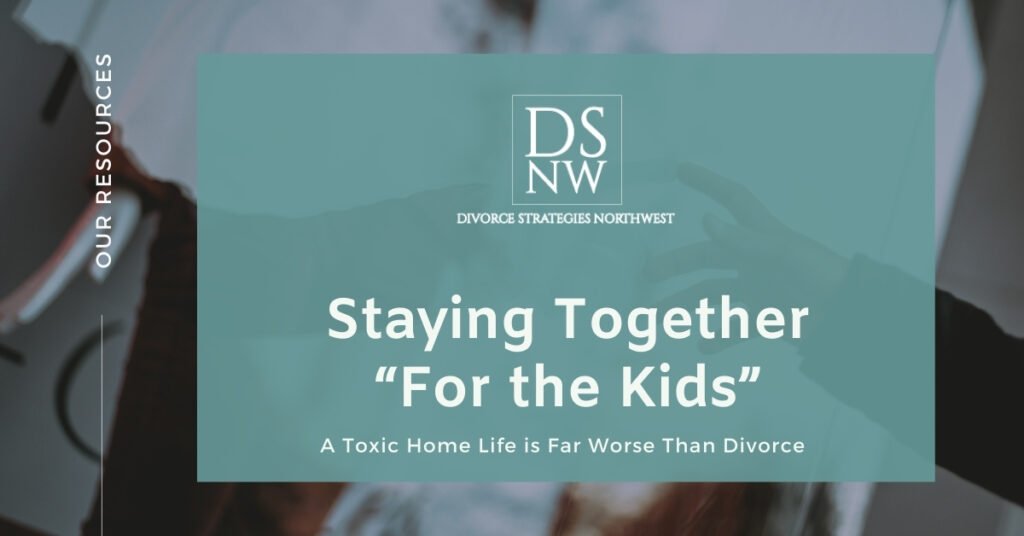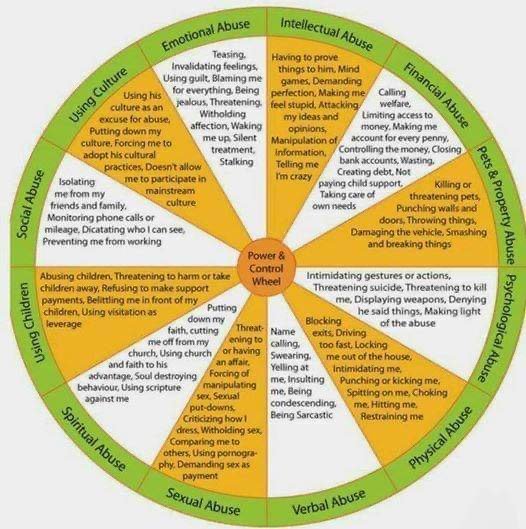
A Toxic Home Life is Far Worse Than Divorce
Sometimes, divorce is best for everyone.
It used to be that even the word divorce was taboo– heads shook, tongues clicked; divorcees were selfish, threatening home-wreckers who were to be isolated and shunned. They were thought of as parents who had destroyed their families and ruined their children’s lives. The message to married couples was clear: Keep your family intact… no matter what.
We all know couples who stay together “for the kids”. The lack of communication, unhappy tone and cold stares are enough to make anyone want to leave home! These families endure tension at home that ripples out, impacting, and damaging every area of their lives. From emotional to physical health, chronic tension wreaks havoc on the human body.
Impact of a Toxic Household on Children
The concept of how divorce impacts children has been researched, debated and studied for decades. While the results are complex, the underlying message is clear. Staying in a toxic marriage is certain to cause children more damage than good. When couples stay together “for the children’s sake,” children do not thrive emotionally when exposed to chronic conflict, estrangement between parents, or disengaged and dysfunctional role modeling.
Studies show one thing that is consistently true: how kids fare after a divorce depends largely on how the process and the aftermath are handled by their parents.
“We all know couples who stay together “for the kids”. The lack of communication, unhappy tone and cold stares are enough to make anyone want to leave home.”
Leah Hill, Founder and CEO, Divorce Strategies Northwest
The impact of a tense home on a growing child is clear: their overworked nervous system, their sense of attachment, constant worry, and general unease are a constant, crippling reality. An unhappy home life sends kids into adulthood ill-equipped to cultivate and navigate healthy relationships. Kids forced to tolerate tension day after day bear the full brunt of their parents’ dysfunctional relationship; there is no escape. They intuitively feel their parents’ unhappiness, sense their chilly vibe, inability to connect and resolve conflict, and can see their lack of intimacy.
Children often blame themselves, feeling their parents’ combative relationship and the tension between them is somehow their fault. They become nervous, apologetic, rageful or apoplectic. In these homes, “staying together for the kids” is a cruel joke with no funny punchline. Parents who stay together, insisting they don’t want to raise their children in a “broken home” fail to recognize that an abusive home is broken… as if there are degrees of brokenness.
Children in abusive households grow up with no understanding or model of a healthy relationship. They are destined to repeat the dismal pattern through poor choices of their own. With an unstable foundation, these children grow up carrying insecurity, a shaky sense of self, and a façade of reality into teen years, adulthood, and into their own families.
The success of how children fare in divorce largely depends on the way the adults choose to navigate their lives as co-parents. Many couples find that once they are living apart, they can become better, more mature versions of themselves, and develop better individual relationships with their children, benefiting everyone in the family.
Here are five ways kids suffer through gloomy, tense and despondent marriages:
1. Chronic Tension
Our parents’ relationship leaves an emotional imprint on us that never fades, good or bad. A natural part of children’s development is internalizing both their parents, and how they process problems. When parents are consistently at odds, their children internalize this conflict. Rather than feeling soothed or comforted at home, they feel tense. These emotions cause turmoil that comes out in other ways. Ongoing tension at home can produce serious emotional, social, and even physical ailments in children, such as depression, hopelessness, eating disorders, unresolved rage and chronic fatigue.
“When parents are consistently at odds, their children internalize this conflict. Rather than feeling soothed or comforted at home, they feel tense. These emotions cause turmoil that comes out in other ways.”
Leah Hill, Founder and CEO, Divorce Strategies Northwest
Research shows that children do better in a well-adjusted, single-parent home than in a hostile, emotionally barren, or chaotic, two-parent home. Create a healthy home environment, regardless of the geography of the living arrangements.
2. No Safe Zone: Physical, Emotional and Psychological Abuse
Domestic abuse is an ugly secret that hides in the shadows of many families. Things can look glossy on the outside, but be woefully painful, tense, and even oppressive behind closed doors. Kids feel forced to put on a happy face in public, while they have no understanding of what a truly healthy relationship looks or feels like. Home is not a safe zone, nor a retreat from the stressors of life and the world.
Children pay the price of eroded self-esteem from suffering within the chaos and turmoil of an unstable home. These children grow up with unresolved perceptions and expectations, as the realities of their own family are hard to understand and reconcile. Unhealthy role models create a vacuum for children shaping their perceptions about the world and healthy living.
3. An Unstable Sense of Self
Warring parents take root inside children’s minds and within their soul. The strain eats away at their security and leaves them with little internal peace, putting them at odds with their own impulses.
For example, they long to be loved, but reject closeness; they yearn for friends but choose isolation; they will have great intellectual or creative abilities, yet sabotage their own efforts. They long to create peace and will often tolerate relationships and abuse they should not. The external conflict between their parents becomes an internal battle within themselves that hinders their emotional development, complicates their life, and jeopardizes their success.
4. Fear of Intimacy
Children raised in an environment filled with tension have great difficulty getting close to others, navigating longevity and trust in relationships. Intimacy triggers the trauma they suffered when witnessing their parents’ dysfunction, so they avoid closeness, to steer clear of getting hurt. If they manage to establish an intimate relationship, they remain cautious and guarded. When conflict arises, the transparency and maturity needed to create healthy boundaries, understand conflict and resolve issues are non-existent. These kids are most likely to flee relationships, or to reenact their parents’ dysfunction and poor behaviors with their own partner(s).
The healthy modeling that did not happen at home leaves these children woefully lacking the skills, resources and maturity to have developed healthy boundaries, intimacy development behaviors and conflict resolution skills. These families send their children into the world lacking a “blueprint”, and they will suffer to overcome these wounds. Maintaining a proper sense of self in a relationship can be impossible for a child who has not seen this modeled at home, and thus, the unhealthy cycle repeats.
5. Mood Problems
Instability at home can produce children who struggle with serious mood problems. These problems, if left untreated, may fuel personality disorders or substance abuse. The root of these problems is a profound lack of hope. They learn at an early age to abandon optimism, expect the worst and fear the future. Growing up living with parents in a toxic marriage can cause kids to mature too quickly and see too much. Their lack of emotional maturity causes them to internalize and misunderstand the facts of their parents’ dysfunction. These experiences can lead to anxiety, depression, and a lack of confidence and trust in others.
With no safe haven, kids grow up learning not to trust their gut instinct and personal intuition. In an effort to maintain stability an abusive environment, many will choose to “stuff” their feelings and emotions. Left unchecked, this dysfunctional habit often carries over into adulthood and can cause more unhealthy relationships, anxiety, depression and emotional deregulation.

Before You Consider Divorce
Couple’s Therapy
Couple’s therapy is an option when both people are actively participating, willing to recognize issues and work to change. A skilled therapist can teach couples how to work through their conflicts without resorting to emotional warfare. It also gives ill-tempered parents a place to work through their differences, rather than exposing their kids to these problems at home. The goal of couple’s therapy is to enrich communication, resolve unhealthy patterns and enhance intimacy.
Choose a skilled therapist who understands your values and the issues at hand. Couple’s therapy can be stressful, traumatic and treacherous; the wrong therapist can make things worse. Gather trustworthy recommendations, take your time and interview several professionals. Try to agree on the therapist you choose to see; otherwise, therapy will become just another bone of contention. The time you invest in working on your relationship will affect your children, your family and your marriage.
Individual Therapy
Nothing stirs up unresolved childhood issues and resentment like marriage, and raising children together. Couples often have unrealistic expectations and are disillusioned when they discover that a good marriage takes hard work. Before you blame all the problems in your marriage on your partner, pursue help for yourself. By taking this step, you are showing your partner and yourself that you are committed to the success of your marriage. A skilled therapist can help you identify problems from your past that are resurfacing in your relationship. Individual therapy is also a good foundation for being a parent and creating a healthy family.
Support Groups
The best outcome of group work comes from sharing your feelings and discovering that you’re not alone. Hearing about other couples’ struggles, the difficulties they face, and how they work through them can bring much-needed inspiration and relief. It also provides you with a community of people who can inspire you with new choices in your marriage and your life.
The best families have open communication, mutual respect, and similar values. Kids thrive in a predictable environment where they feel safe, secure, and are loved unconditionally. Parents’ health will benefit as well!
Divorce is an option to be taken seriously and with caution, but if you’ve evaluated your daily home life and still feel unease, take the time to learn more about divorce and what it would mean for you.
You’re all worth it.
Your Trusted Partner
Whether you’re contemplating a divorce, have already started the process, or are far into the proceedings, do you wish you had someone to share with you the inside scoop on how to save money, time and emotional energy on your divorce?
Our team is available for Support On-Demand to discuss the many scenarios, options, and implications of separation or divorce, via telephone or videoconference during this time. Feel free to get in touch with us; we are here for you!




